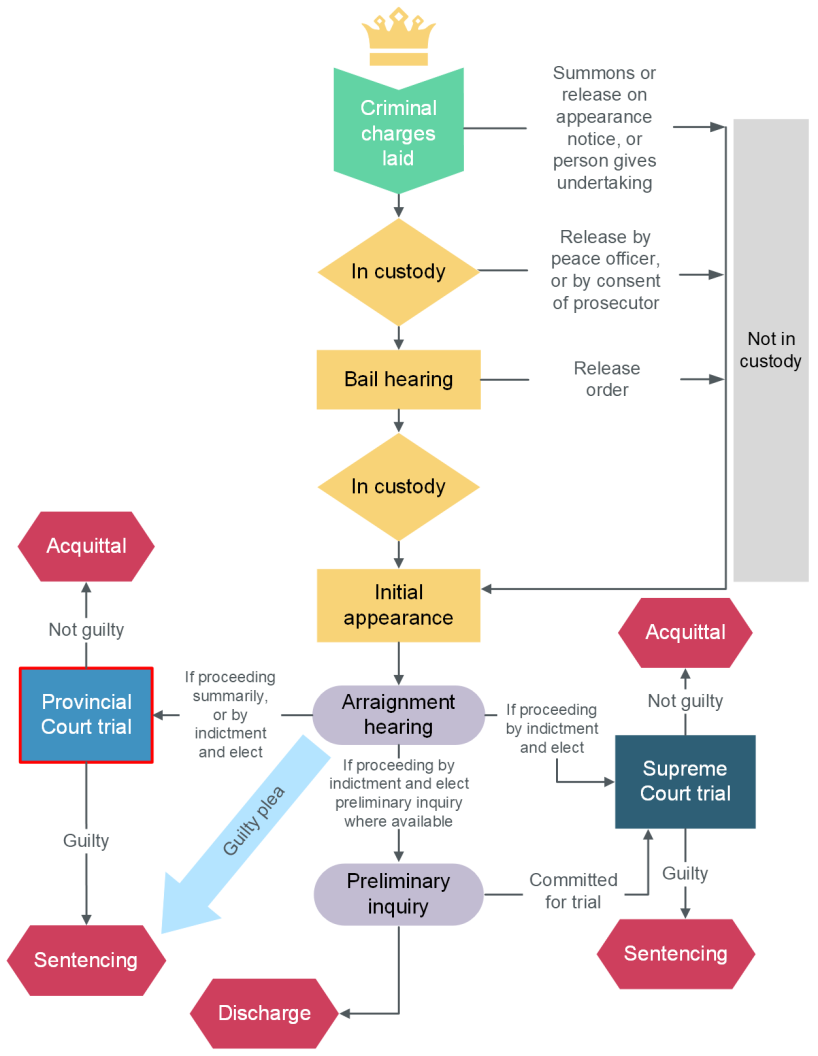Provincial court trial

Preparing for trial
You should start preparing for your trial soon after you are charged.
You may wish to have witnesses testify for you. If you do, you must make sure that the witnesses come to court on the day of the trial. You can ask the witnesses to come to court, or get a subpoena<p><span lang="EN-US">A document issued by the Court ordering a person to come to court to be a witness. It may also require them to bring evidence with them. (pronounced “sub-peena”)</span><span> </span></p> from a justice of the peace<p class="Paragraph SCXO25726696 BCX8" lang="EN-US">Justices of the peace are employed by the Court Services Branch of the Ministry of the Attorney General (Government of BC). They work in court registries in positions such as court manager and court clerk.</p><p class="Paragraph SCXO25726696 BCX8" lang="EN-US"><span lang="EN-US"></span></p> at the court registry. A subpoena is a court order requiring a witness who has relevant evidence to come to court. If you have a lawyer, your lawyer will take care of interviewing and subpoenaing your witnesses.
Presumption of innocence
Crown counsel<p>Independent lawyers with the federal or provincial prosecution service. Crown counsel do not represent the government, police or victim of crime. Rather, they perform their function on behalf of the public. Crown counsel may also be referred to as Crown, Crown prosecutors or prosecutors.</p> is required to prove a criminal charge "beyond a reasonable doubt<p><span lang="EN-US">An expression used in law to mean the judge or jury deciding the case is very sure that the accused is guilty. In a criminal case, Crown counsel must prove the charges beyond a reasonable doubt.</span><span> </span></p>".
You do not have to prove that you are innocent. You do not have to testify, call any witnesses, or offer any evidence at all at your trial. However, you may decide that it is in your interest to do so, especially if Crown counsel appears to have a strong case against you. If you have a lawyer, they will advise you, but it is up to you to decide.
Evidence in a trial
The evidence in the trial consists of the witnesses’ testimony and any photographs, documents or other physical items of evidence adequately identified by a witness and ruled admissible by the judge.
Trial procedure
At your trial, Crown counsel will call witnesses to testify and say what they know about the case. A witness must swear an oath<p><span lang="EN-US">A solemn promise to tell the truth sworn on a holy book or symbol. </span><span> </span></p> or make an affirmation promising to tell the truth before testifying. When children testify they simply promise to tell the truth.
Crown counsel questions each Crown witness first. Then you, or your lawyer if you have one, may question the Crown witness. This is called cross examination<p><span lang="EN-US">When a lawyer or person without a lawyer questions a witness presented by another party. The party presenting the witness questions them first. </span><span> </span></p>.
After all Crown witnesses have given their testimony and have been cross-examined, you may choose to testify. If you testify, Crown counsel may cross-examine you. You can also present and question defence witnesses, and Crown counsel can cross-examine those witnesses.
After all the evidence has been introduced, both Crown and defence sum up their positions in closing arguments.
You can only be found guilty (convicted<p><span lang="EN-US">An accused person is convicted when they plead guilty or are found guilty and the judge does not grant them a discharge. </span><span> </span></p>) of an offence if the evidence in the trial proves your guilt beyond a reasonable doubt. The judge is responsible for deciding whether the evidence meets that test, ensuring that the trial is fair and ensuring that your rights are protected. If the evidence does not prove you are guilty, you will be acquitted (found not guilty<p><span lang="EN-US">An accused person makes a “not guilty” plea at an arraignment hearing when they do not admit committing the offence. In a trial, when the prosecutor cannot prove beyond a reasonable doubt that a person committed an offence, the judge or judicial justice must find them “not guilty”.</span><span> </span></p>) and the charge will be dismissed.
If you are found guilty or plead guilty to a crime, you will receive a sentence<p><span lang="EN-US">A court order setting out the consequences of being convicted of a crime. Sentences may include fines, community supervision or jail. </span><span> </span></p>.
Appeal
If you or Crown counsel believes the judge has made an error, either side may file an appeal within 30 days of acquittal<p><span lang="EN-US">When, at the end of a trial, the judge finds the accused not guilty of committing the crime. </span><span> </span></p> or 30 days of the date a sentence is imposed.
Appeals for summary offences<p><span lang="EN-US">These are less serious offences. The maximum penalty for a summary offence is usually a $5,000 fine and/or six months in jail, although some summary offences have higher maximum sentences. </span><span> </span></p> occur at the BC Supreme Court. Appeals for indictable offences<p><span lang="EN-US">More serious offences (for example, break and enter, aggravated sexual assault and murder). A person charged with some indictable offences may choose to be tried in Provincial Court or by a BC Supreme Court judge or jury, possibly after having a preliminary hearing. </span><span> </span></p> occur at the BC Court of Appeal.
